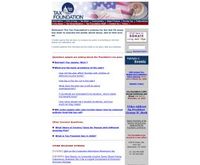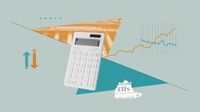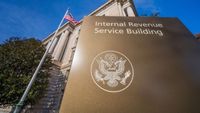Explore web search results related to this domain and discover relevant information.

The Tax Foundation is a Washington, D.C.-based think tank, founded in 1937, that collects data and publishes research studies on U.S. tax policies at both the federal and state levels. The Foundation's stated mission is to "educate taxpayers about sound tax policy and the size of the tax burden ...
The Tax Foundation is a Washington, D.C.-based think tank, founded in 1937, that collects data and publishes research studies on U.S. tax policies at both the federal and state levels. The Foundation's stated mission is to "educate taxpayers about sound tax policy and the size of the tax burden borne by Americans at all levels of government."The Foundation's stated mission is to 'educate taxpayers about sound tax policy and the size of the tax burden borne by Americans at all levels of government.' The Tax Foundation is organized as 501(c)(3) tax-exempt non-profit educational and research organization.The group is known for its annual reports such as 'Facts & Figures: How Does Your State Compare' which was first produced in 1941 and Tax Freedom Day for the United States, which it has produced since the early 1970s." -- Summary retrieved on October 7, 2019 http://dbpedia.org/resource/Tax_FoundationView Captures - Source Url: http://www.taxfoundation.org/ | View Beta Presentation. Some content may be under embargo.
Learn which are the tax free mutual funds, understand tax free mutual fund returns, and find out what a tax free mutual fund really means for investors with m.Stock
As one goes about understanding the universe of mutual funds in India, there are numerous choices before the investor, each with its unique characteristics. Some of them are unique in that they promise tax benefits.Although the description "tax-free" for · mutual funds can be confusing at times, it would be better to qualify those schemes or funds that provide tax relief or are tax-optimal in design.Tax-saving mutual funds represent a specific category of investment designed primarily to assist individuals in reducing their taxable income, in accordance with various provisions of the Indian Income Tax Act.The basic nature of tax-saving mutual funds is two-fold: creating wealth through involvement in the market and allowing for deductions from taxable income. In contrast to certain other investment options, ELSS funds have a compulsory lock-in, usually three years from the date of investment.

We’re committed to helping you get your economic impact, or stimulus, payment as soon as possible. See if you are eligible for an Economic Impact Payment.
Unclaimed stimulus payments - Dec. 20, 2024: Latest news on the 2021 Recovery Rebate Credit - IRS announces special payments going this month to 1 million taxpayers who did not claim 2021 Recovery Rebate Credit; encourages non-filers about approaching deadline to claim creditsMost eligible people already received their Economic Impact Payments. However, people who are missing stimulus payments should review the information below to determine their eligibility to claim a Recovery Rebate Credit for tax year 2020 or 2021.You will need this information from your online account or your letter to accurately calculate your 2021 Recovery Rebate Credit when you file your 2021 federal tax return in 2022. For married filing joint individuals, each spouse will need to log into their own online account or review their own letter for their half of the total payment.Securely access your IRS online account to view the total of your first, second and third Economic Impact Payment amounts under the Tax Records page.

Tax-efficient investments, like tax-managed funds, exchange-traded funds (ETFs), treasury products, and municipal bonds, can significantly reduce tax liabilities when strategically used. Tax-managed funds and ETFs typically generate fewer capital gains, which can lower your tax burden.
Because these accounts actively keep tax liabilities as low as possible, they're well-suited for taxable accounts. Municipal bonds are issued by state and local governments to fund day-to-day operations or special projects like building public schools or highways.Retirement accounts are inherently part of a tax-efficient investment strategy. To amplify the tax efficiency of these accounts while considering your own circumstances, consider investing in high-dividend or high-growth funds inside your account.They may also want to consult their financial or tax advisors periodically to review their portfolio's efficiency. Finally, they should stay up to date on contribution limits for retirement and tax-advantaged accounts and contribute as much as possible while still allocating enough funds for non-retirement-related goals.Tax-managed funds, municipal bonds, and Treasury bonds are common tax-efficient investment vehicles.
Please note: Your tax payment is due regardless of this Web site's availability. You can always make a tax payment by calling our voice response system at 1.800.555.3453. Follow the prompts to make your payment · The IRS continues to remind taxpayers to watch out for email schemes.
Your refund was used to pay your IRS tax balance or certain state or federal debts. Your refund from a joint return was applied to your spouse's debts. If your refund is missing or destroyed, request a replacement check. If you entered the wrong account or routing number, call us at 800-829-1040 to stop the deposit. If it's already deposited to another account, you must contact your bank to recover your funds...
Explore options for getting your federal tax refund, how to check your refund status, how to adjust next year’s refund and how to resolve refund problems.If you paid more through the year than you owe in tax, you may get money back. Even if you didn't pay tax, you may still get a refund if you qualify for a refundable credit. To get your refund, you must file a return.You have 3 years to claim a tax refund.To get a bigger or smaller refund next filing season, adjust the taxes you pay through the year with the Tax Withholding Estimator.
News from Israel, the Middle East and the Jewish World
Learn about the tax differences, including the treatment of capital gains and dividends, between ETFS and mutual funds.
However, ETFs are structured in such a manner that taxes are minimized for the holder of the ETF and the ultimate tax bill (after the ETF is sold and capital gains tax is incurred) is less than what the investor would have paid with a similarly structured mutual fund.For the most part, ETF managers are able to manage the secondary market transactions in a manner that minimizes the chances of an in-fund capital gains event. It's rare for an index-based ETF to pay out a capital gain; when it does occur it's usually due to some special unforeseen circumstance. Of course, investors who realize a capital gain after selling an ETF are subject to the capital gains tax.If the investor has held the fund for more than 60 days before the dividend was issued, the dividend is considered a “qualified dividend” and is taxed anywhere from 0% to 20% depending on the investor’s income tax rate. If the dividend was held less than 60 days before the dividend was issued, then the dividend income is taxed at the investor’s ordinary income tax rate.This is similar to how mutual fund dividends are treated. Certain international ETFs, particularly emerging market ETFs, have the potential to be less tax efficient than domestic and developed market ETFs. Unlike most other ETFs, many emerging markets are restricted from performing in-kind deliveries of securities.


Private equity firms and hedge funds benefit from several controversial provisions in the current U.S. tax code, including the carried interest loophole.
Private equity firms and hedge funds benefit from several controversial provisions in the current U.S. tax code. Critics refer to these special tax breaks as loopholes, while defenders justify them as a fair means of rewarding risk.As partnerships, private equity funds and hedge funds generally qualify as flow-through entities (also known as pass-through entities). This means that rather than being subject to taxation themselves (as corporations are), they pass their entire tax liability onto their investors, escaping double taxation.The Ending the Carried Interest Loophole Act was introduced in the Senate in August 2021, but it remains in committee. Sen. Sheldon Whitehouse (D-R.I.), a sponsor of the bill, maintained that “Americans have had enough of hedge fund tycoons using this special carve-out to pay lower tax rates than their drivers.We need to rebuild our tax code to guard against the ultra-rich and corporations scheming to avoid paying their fair share.” · Meanwhile, the defenders of carried interest maintain that eliminating it would be counterproductive. The U.S. Chamber of Commerce, for example, has said that such a law would “restrict access to capital, harming job creation and innovation,” among other dire predictions. The primary difference between private equity and hedge funds is in their investments.
A federal judge approved Vanguard Group's $25 million settlement of a lawsuit accusing the U.S. mutual fund company of improperly saddling investors in its target-date funds with inflated tax bills.
Sept 9 (Reuters) - A federal judge approved Vanguard Group's $25 million settlement of a lawsuit accusing the U.S. mutual fund company of improperly saddling investors in its target-date funds with inflated tax bills.Many investors moved to those fund classes from higher-cost retail classes. This forced retail funds to sell assets to meet redemptions and pass taxable capital gains to the plaintiffs and other remaining investors.Target-date funds contain mixes of stocks, bonds, and cash that are designed to become less risky as investors get older, and to be tax-efficient.Lawyers for the investors said the $25 million is in addition to a $133 million fair fund set up in the SEC case.

While critics often raise concerns ... investments. Consequently, when thinking about the costs that taxes impose, those costs should be weighed against the benefits the nation receives from the expenditure of those funds....
While critics often raise concerns about “government spending” in the abstract, it is important to determine whether the actual public services and investments that government programs provide are valuable. Federal revenue is used to pay for these services and investments. Consequently, when thinking about the costs that taxes impose, those costs should be weighed against the benefits the nation receives from the expenditure of those funds.This category consists of the Medicare function (570), including benefits, administrative costs, and premium income, as well as the “Grants to States for Medicaid” account, the “Children’s health insurance fund” account, the ACA’s “Refundable Premium Tax Credit and Cost Sharing Reductions” account, and the ACA’s “Risk Adjustment Program Payments” account (all in function 550).In fiscal year 2024, the federal government spent $6.9 trillion, amounting to 24 percent of the nation’s gross domestic product (GDP), according to the June 2024 estimates of the Congressional...Economic security programs include: the refundable portions of the Earned Income Tax Credit and Child Tax Credit, which assist low- and moderate-income working families; programs that provide cash payments to eligible individuals or households, including unemployment insurance and Supplemental Security Income for low-income people who are over age 65 or disabled; various forms of in-kind assistance for low-income people, including the Supplemental Nutrition Assistance Program (formerly known as food stamps), school meals, low-income housing assistance, child care assistance, and help meeting home energy bills; and other programs such as aid for abused or neglected children.


A federal judge approved Vanguard Group's $25 million settlement of a lawsuit accusing the U.S. mutual fund company of improperly saddling investors in its target-date funds with inflated tax bills.
Sept 9 (Reuters) - A federal judge approved Vanguard Group's $25 million settlement of a lawsuit accusing the U.S. mutual fund company of improperly saddling investors in its target-date funds with inflated tax bills.Many investors moved to those fund classes from higher-cost retail classes. This forced retail funds to sell assets to meet redemptions and pass taxable capital gains to the plaintiffs and other remaining investors.Target-date funds contain mixes of stocks, bonds, and cash that are designed to become less risky as investors get older, and to be tax-efficient.Lawyers for the investors said the $25 million is in addition to a $133 million fair fund set up in the SEC case.

Learn about capital gains, cost basis, qualified dividends, tax-free dividends. and other factors that go into how much you're taxed on mutual funds.
Claire's expertise lies in corporate finance & accounting, mutual funds, retirement planning, and technical analysis. ... Vikki Velasquez is a researcher and writer who has managed, coordinated, and directed various community and nonprofit organizations. She has conducted in-depth research on social and economic issues and has also revised and edited educational materials for the Greater Richmond area. ... Tax-Deferred vs.In other cases, you may be eligible to pay the lower capital gains tax rate. Other distributions may be completely tax-free. Mutual funds that create a lot of short-term capital gains—and are taxed at ordinary income (not capital gains) rates—can cost you.The difference between ordinary income and capital gains income can make a huge difference to your tax bill. In short, only investment income you derive from investments held for more than a year is considered capital gains. This concept is pretty straightforward when it comes to investing in individual stocks. The world of mutual funds, however, is a little more complicated.The capital gains tax rates are 0%, 15%, and 20%, and also depend on your filing status and income. If you sell your shares in a mutual fund, any amount of the proceeds that is a return on your original investment is not taxable since you already paid income taxes on those dollars when you earned them.
TOP matches people and businesses who owe delinquent debts with money that federal agencies are paying (for example, a tax refund).
Direct Deposit (Electronic Funds Transfer) Direct Express® · E · EagleCash · eCollections · eCommerce Collections · Electronic Check Processing · EFTPS - Electronic Federal Tax Payment System · Electronic Funds Transfer · EEO Complaint Process · EEO Policy Statement ·

Traditional mutual funds and ETFs for tax-efficient exposure to domestic and international stocks as well as bonds.
And that assumes the investor didn’t sell at the end of the period but simply bought and held; the 1.57% per year tax-cost ratio was simply her carrying cost for the fund and doesn’t factor in any taxes due upon the sale.It’s usually not a good idea to hold taxable-bond funds in a taxable account, particularly for people in higher tax brackets, and that’s especially true now that yields have gone up to more meaningful levels. That’s because the majority of the return that bonds earn comprises income rather than capital gains, and income is taxed at the ordinary income tax rate versus the lower capital gains rate.The typical intermediate-term core bond fund returned 1.30% over the past 10 years and had a tax-cost ratio of 1.06%. For investors in the highest tax bracket who bought and held a taxable-bond fund in a taxable account (again, usually not advisable), their tax burden would have gobbled up most of the returns of the fund.And it’s certainly true that good asset location can help reduce the drag of taxes. For example, by holding taxable bonds in their tax-sheltered accounts, investors will be on the hook for taxes only when they pull money out, not for any income their bonds or bond funds kick off during their holding periods.

An opportunity zone is an investment program created by the Tax Cuts and Jobs Act of 2017 giving certain investments in lower income areas tax advantages. Opportunity zones funds generated buzz when introduced four years ago, but they've always been more about hype than substance when it comes ...
An opportunity zone is an investment program created by the Tax Cuts and Jobs Act of 2017 giving certain investments in lower income areas tax advantages. Opportunity zones funds generated buzz when introduced four years ago, but they've always been more about hype than substance when it comes to tax planning.Even if the tax code is changed to promote the zones, they're best kept at arm's length. ... Opportunity zone fund investments are back.An opportunity zone is an investment program created by the Tax Cuts and Jobs Act of 2017 giving tax advantages to certain investments in lower income areas . Qualified opportunity zone funds allow individuals to roll gains from any capital asset into under-invested communities and defer the income taxes until Dec.Moreover, anyone who stays in such a fund for at least 10 years receives a stepped-up basis on that investment's return. On the surface, these benefits seem tempting. However, as financial advisors ponder deferral strategies for their high-net-worth clients who may be impacted by potential tax hikes, they need to understand some of the red flags associated with investments in opportunity zones.

The Treasury Department received a mysterious and anomalous payment of $7 billion in estate taxes in early 2023, which spurred questions about who was the source of funds.
Based on data going back to 1993, Ricco compiled the top 10 days by estate tax receipts which ranged from $907 billion on April 12, 2024, to the $1.613 billion in estate taxes received on March 8, 2010. He said that Feb.He also noticed that "almost all of these days are during tax season – days when there is some kind of legal filing deadline, so the IRS is receiving many payments at once. But that's not the case for Feb. 28, 2023, which was just some ordinary day as far as tax rules are concerned.Fernholz later found IRS data pointing to Texas as the source of payment, which is where he had lived and worked. He was unable to confirm Sarofim as the generous billionaire who made the estate tax payment and left open the possibility that a living billionaire made the payments in advance.The Treasury Department's Internal Revenue Service is legally forbidden from disclosing information about tax payments, so the IRS is unable to shed light on the identity of the taxpayer who was the source of the payment.
A tax efficient fund is a mutual fund structured to reduce tax liability.
The T. Rowe Price Tax-Efficient Equity Fund pursues the significant return potential of stocks while seeking to reduce the long-term tax burden by investing in a broad range of equities—from mid- and small caps whose futures appear especially promising, to large companies operating in dynamic industries.In an effort to achieve strong after-tax returns, the fund seeks to avoid realizing capital gain distributions by limiting sales of existing holdings and not rotating from one sector to another in an attempt to capture short-term outperformance. However, taxable gains may be realized in order to satisfy redemption requests or when they believe the benefits of continuing to hold a security outweighs tax considerations.Index Fund vs. ETF: What's the Difference? Tax Planning: Strategies, Benefits, and Real-Life ExamplesA tax-efficient fund is a mutual fund that’s designed to minimize tax liability for its shareholders through strategic investment choices and low turnover.
:max_bytes(150000):strip_icc()/Tax-EfficientFundWhatItIsHowItWorksExampleGettyImages-1184199076-f0a56eb06b2f44539cc367f3528a0c02.jpg)

Consumption funds are regaining traction on Dalal Street with tax cuts, GST reforms, and festive demand. Mohit Gang, Co-founder and CEO of Moneyfront, explains why investors should treat them as tactical bets rather than core holdings.
After months of buzz around capex, infrastructure and defence, investors are once again looking at consumption funds as a theme worth tracking. The change comes on the back of tax reforms, rate cuts, and festive-season optimism that promise to leave more money in the hands of consumers.He pointed out that a mix of direct income tax cuts, GST reductions, and India’s strong demographics are propelling household spending. From daily essentials to autos, multiple sectors are seeing tailwinds. According to Gang, investors with higher risk appetite can tactically allocate up to 10–15% of their portfolio to this theme, but he advised against overexposure. “Whenever you are taking a sectoral bet, I would rather lean towards an active fund,” he said, explaining that active managers can capture mid- and small-cap opportunities better than index-based passive funds.HomePersonal Finance NewsConsumption funds back in focus: Tax cuts, GST boost, and festive cheer drive investor interestPopular choices in this category include Axis Consumption Fund, Nippon India Consumption Fund, and Mirae Asset Consumption Fund. For those seeking aggressive plays, Motilal Oswal Mid & Small Consumption Index Fund provides exposure to mid- and small-cap names.

Exchange-traded funds can reduce investors' tax bills. But those tax savings benefit certain types of investors more than others.
They're a moot point for retirement investors, like those who save in a 401(k) plan or individual retirement account, experts said. Retirement accounts are already tax-preferred, with contributions growing tax-free — meaning ETFs and mutual funds are on a level playing field relative to taxes, experts said.Taxpayers who sell investments for a capital gain (i.e., a profit) are likely familiar with the concept of paying tax on those earnings. The same concept applies within a mutual fund: Mutual fund managers generate capital gains when they sell holdings within the fund.However, ETF managers are generally able to avoid capital gains taxes due to their unique structure. The upshot is that asset classes that generate large capital gains relative to their total return are "a primary use case for ETFs," Armour told CNBC. (This discussion only applies to buying and selling within the fund.An investor who sells their ETF for a profit may still owe capital gains tax.) U.S. stock mutual funds have tended to generate the most capital gains relative to other asset classes, experts said.




:max_bytes(150000):strip_icc()/Tax-EfficientFundWhatItIsHowItWorksExampleGettyImages-1184199076-f0a56eb06b2f44539cc367f3528a0c02.jpg)